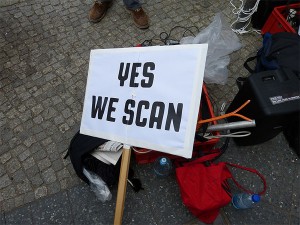Phone snooping in Canada

Sign carried in protest against NSA surveillance programs. Photo: Mike Herbst, Creative Commons, some rights reserved
In the wake of revelations about government surveillance in the U.S., it’s only natural to wonder what’s going on in other countries.
Here’s a recent article from the Globe and Mail about norms in Canada:
For nearly two decades, Ottawa officials have told telecommunications companies that one of the conditions of obtaining a licence to use wireless spectrum is to provide government with the capability to monitor the devices that use the spectrum.
There are regulations that govern this access, though the back-scenes details ate not generally available to the public.
But The Globe and Mail has obtained past and current versions of the accord, which governs the way that mobile-phone companies help police pursue suspects by monitoring telecommunications – including eavesdropping, reading SMS texts, pinpointing users’ whereabouts, and even unscrambling some encrypted communications.
Wireless carriers are told they must be ready to hand over such data should police or intelligence agencies compel the release of the information through judicially authorized warrants. Such information goes well beyond traditional wiretaps, and also includes phone logs and keystrokes.
In some respects, this appears to be along an older model of needing a court order before tapping a phone for the purposes of criminal investigations.
But those who worry about sacrificing personal rights in the name of fighting crime, terrorism or espionage still have concerns about transparency and application, as expressed here:
“We would suggest that a piece that governs the behaviour of telecom providers licensed to operate in Canada ought to be available for public discussion by parliamentarians, academics and security researchers,” said Scott Hutchinson, a spokesman for the Privacy Commissioner of Canada.
This post is not a comprehensive summary of the subject, just another detail along the way.
Tags: canada, cell phone security, crime, law, national security, police surveilance, privicy issues







